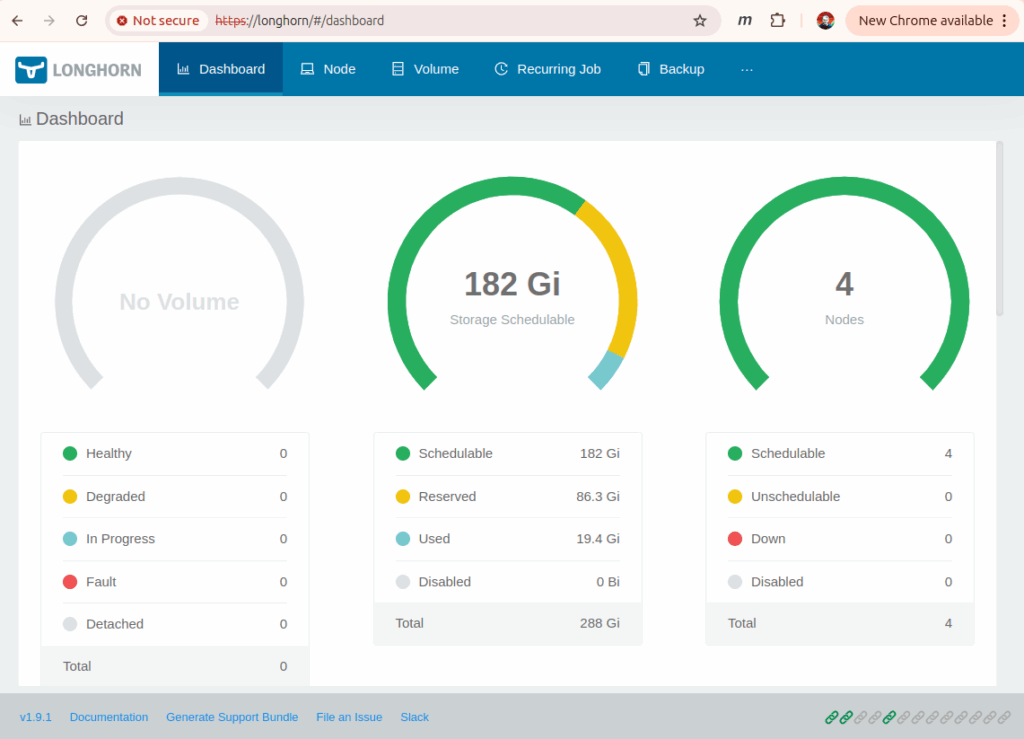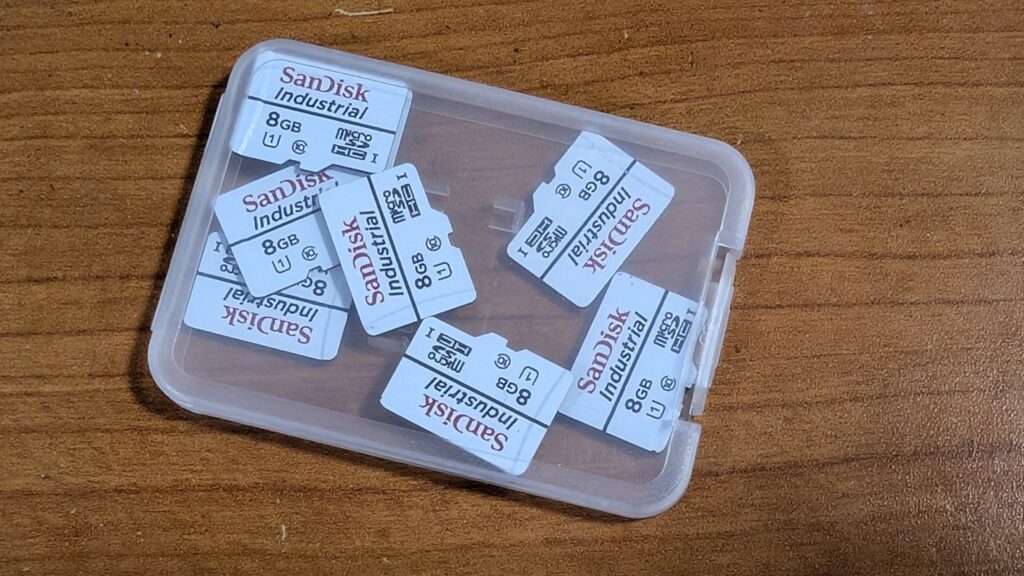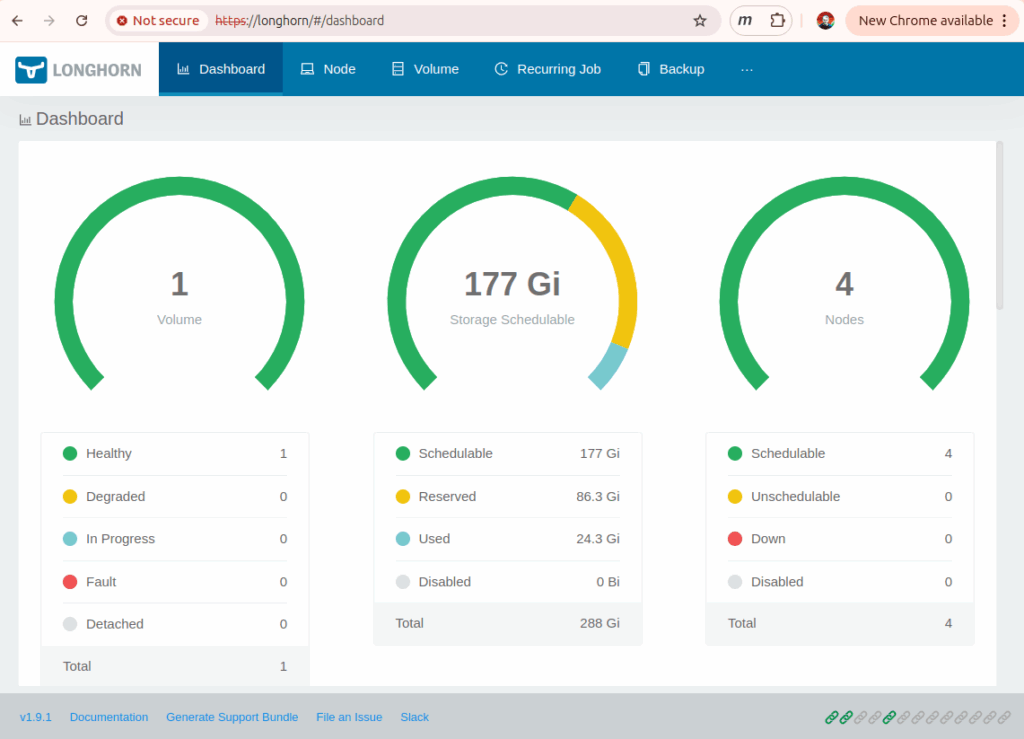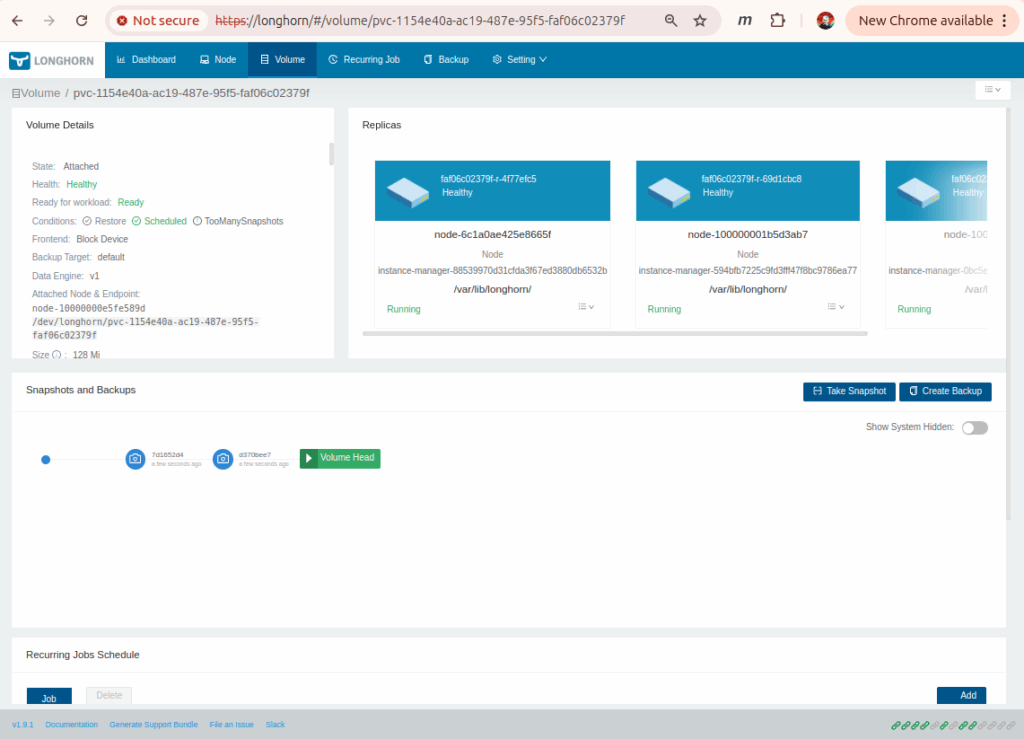So there’s a problem in the kubernetes pi-cluster…When I dump a list of pods vs nodes it looks like this:
sandy@bunsen:~/arkade$ kubectl -n games get pods -ojsonpath='{range .items[*]}{.metadata.name},{.spec.nodeName}{"\n"}{end}'
1943mii-b59f897f-tkzzj,node-100000001b5d3ab7
20pacgal-df4b8848c-dmgxj,node-100000001b5d3ab7
centiped-9c676978c-pdhh7,node-100000001b5d3ab7
circus-7c755f8859-m8t7l,node-100000001b5d3ab7
defender-654d5cbfc5-pv7xk,node-100000001b5d3ab7
dkong-5cfb8465c-zbsd6,node-100000001b5d3ab7
gng-6d5c97d9b7-9vvhn,node-100000001b5d3ab7
invaders-76c46cb6f5-mr9pn,node-100000001b5d3ab7
joust-ff654f5b9-c5bnv,node-100000001b5d3ab7
milliped-86bf6ddd95-xphhg,node-100000001b5d3ab7
pacman-559b59df59-9mkvq,node-100000001b5d3ab7
qix-7d5995ff79-cdt4d,node-100000001b5d3ab7
robby-5947cf94b7-w4cfq,node-100000001b5d3ab7
supertnk-5dbbffdf7f-9v4vd,node-100000001b5d3ab7
topgunnr-c8fb7467f-nlvzn,node-100000001b5d3ab7
truxton-76bf94c65f-72hbt,node-100000001b5d3ab7
victory-5d695d668c-d9wth,node-100000001b5d3ab7
All the pods are on the same node! But I’ve got three nodes and a control plane running
sandy@bunsen:~/arkade$ kubectl get nodes
NAME STATUS ROLES AGE VERSION
node-100000001b5d3ab7 Ready <none> 39m v1.33.3+k3s1
node-100000008d83d984 Ready <none> 33m v1.33.3+k3s1
node-10000000e5fe589d Ready <none> 39m v1.33.3+k3s1
node-6c1a0ae425e8665f Ready control-plane,master 45m v1.33.3+k3s1
Access Mode Trouble
The is a problem with the rom data PersistentVolumeClaim:
sandy@bunsen:~/arkade$ cat roms-pvc.yaml
apiVersion: v1
kind: PersistentVolumeClaim
metadata:
name: roms
namespace: games
spec:
accessModes:
- ReadWriteOnce
storageClassName: local-path
resources:
requests:
storage: 128Mi
When I setup the PVC I just used the built-in local-path storage class that comes default with k3s. local-path only supports ReadWriteOnce accessMode which means any pods that want to mount the roms volume have to be placed on the same node.
Trying out Longhorn
So I thought I’d give Longhorn a try. The basic install goes like this:
kubectl apply -f https://raw.githubusercontent.com/longhorn/longhorn/v1.9.1/deploy/longhorn.yaml
There’s a nice frontend user interface for the system so I added a Traefik IngressRoute to get at that (and a host-record for dnsmasq on the cluster’s router).
sandy@bunsen:~/k3s$ more longhorn_IngressRoute.yaml
apiVersion: traefik.io/v1alpha1
kind: IngressRoute
metadata:
name: longhorn
namespace: longhorn-system
spec:
entryPoints:
- websecure
routes:
- kind: Rule
match: Host(`longhorn`)
priority: 10
services:
- name: longhorn-frontend
port: 80
tls:
certResolver: default
kubectl apply -f longhorn_IngressRoute.yaml
After a little wait the UI was available:

Size Matters
Pretty quickly after that the whole cluster crashed (the picture above was taken just now after I fixed a bunch of stuff).
When I first setup the cluster I’d used micro SD cards like these ones:

After running the cluster for about a week and then adding Longhorn, the file systems on the nodes were pretty full (especially on the control-plane node). Adding the longhorn images put storage pressure on the nodes so that nothing could schedule. So I switched out the micro SD cards (128GB on the control-plane and 64GB on the other nodes). Then I rolled all the nodes to reinstall the OS and expand the storage volumes.
With a more capable storage driver in place, it was time to try updating the PVC definition:
andy@bunsen:~/arkade$ cat roms-pvc.yaml
apiVersion: v1
kind: PersistentVolumeClaim
metadata:
name: roms
namespace: games
spec:
accessModes:
- ReadWriteMany
storageClassName: longhorn
resources:
requests:
storage: 128Mi
Here I changed to ReadWriteMany access mode and longhorn storageClassName. Then re-deploy my arkade projects:
make argocd_create argocd_sync
...
sandy@bunsen:~/arkade$ kubectl -n games get pods
NAME READY STATUS RESTARTS AGE
1943mii-b59f897f-rsklf 0/1 ContainerCreating 0 3m30s
...
topgunnr-c8fb7467f-c7hbb 0/1 ContainerCreating 0 3m2s
truxton-76bf94c65f-8vzn4 0/1 ContainerCreating 0 3m
victory-5d695d668c-9wdcv 0/1 ContainerCreating 0 2m59s
Something’s not right the pods aren’t starting…
sandy@bunsen:~/arkade$ kubectl -n games describe pod victory-5d695d668c-9wdcv
Name: victory-5d695d668c-9wdcv
...
Containers:
game:
Container ID:
Image: docker-registry:5000/victory:latest
Image ID:
Port: 80/TCP
Host Port: 0/TCP
State: Waiting
...
Conditions:
Type Status
PodReadyToStartContainers False
Initialized True
Ready False
ContainersReady False
PodScheduled True
Volumes:
roms:
Type: PersistentVolumeClaim (a reference to a PersistentVolumeClaim in the same namespace)
ClaimName: roms
ReadOnly: false
...
Node-Selectors: <none>
Tolerations: node.kubernetes.io/not-ready:NoExecute op=Exists for 300s
node.kubernetes.io/unreachable:NoExecute op=Exists for 300s
Events:
Type Reason Age From Message
---- ------ ---- ---- -------
Normal Scheduled 3m39s default-scheduler Successfully assigned games/victory-5d695d668c-9wdcv to node-100000001b5d3ab7
Warning FailedAttachVolume 3m11s (x3 over 3m36s) attachdetach-controller AttachVolume.Attach failed for volume "pvc-003e701a-aec0-4ec5-b93e-4c9cc9b25b1c" : CSINode node-100000001b5d3ab7 does not contain driver driver.longhorn.io
Normal SuccessfulAttachVolume 2m38s attachdetach-controller AttachVolume.Attach succeeded for volume "pvc-003e701a-aec0-4ec5-b93e-4c9cc9b25b1c"
Warning FailedMount 2m36s kubelet MountVolume.MountDevice failed for volume "pvc-003e701a-aec0-4ec5-b93e-4c9cc9b25b1c" : rpc error: code = Internal desc = mount failed: exit status 32
Mounting command: /usr/local/sbin/nsmounter
Mounting arguments: mount -t nfs -o vers=4.1,noresvport,timeo=600,retrans=5,softerr 10.43.221.242:/pvc-003e701a-aec0-4ec5-b93e-4c9cc9b25b1c /var/lib/kubelet/plugins/kubernetes.io/csi/driver.longhorn.io/a8647ba9f96bea039a22f898cf70b4284f7c1b8ba30808feb56734de896ec0b8/globalmount
Oh – the NFS mounts are failing. Guess I need to install NFS in the nodes. To do that, I just updated my cloud-init/userdata definition to add the network tool packages:

roll – reinstall – redeploy – repeat…
Finally Distributed Storage
sandy@bunsen:~/arkade$ kubectl -n games get pods -ojsonpath='{range .items[*]}{.metadata.name},{.spec.nodeName}{"\n"}{end}'
1943mii-b59f897f-qfb97,node-100000008d83d984
20pacgal-df4b8848c-x2qdm,node-100000001b5d3ab7
centiped-9c676978c-qcgxg,node-100000008d83d984
circus-7c755f8859-s2t87,node-100000001b5d3ab7
defender-654d5cbfc5-7922b,node-10000000e5fe589d
dkong-5cfb8465c-6hnrn,node-100000008d83d984
gng-6d5c97d9b7-7qc9n,node-10000000e5fe589d
invaders-76c46cb6f5-m2x7n,node-100000001b5d3ab7
joust-ff654f5b9-htbrn,node-100000001b5d3ab7
milliped-86bf6ddd95-sq4jt,node-100000008d83d984
pacman-559b59df59-tkwx4,node-10000000e5fe589d
qix-7d5995ff79-s8vxv,node-100000001b5d3ab7
robby-5947cf94b7-k876b,node-100000008d83d984
supertnk-5dbbffdf7f-pn4fw,node-10000000e5fe589d
topgunnr-c8fb7467f-5v5h6,node-100000001b5d3ab7
truxton-76bf94c65f-nqcdt,node-10000000e5fe589d
victory-5d695d668c-dxdd8,node-100000008d83d984
!!
Longhorn Setup
Here’s my longhorn setup script:
sandy@bunsen:~/k3s$ cat longhorn.sh
#!/bin/bash
. ./functions.sh
kubectl apply -f https://raw.githubusercontent.com/longhorn/longhorn/v1.9.1/deploy/longhorn.yaml
kubectl apply -f longhorn_IngressRoute.yaml
https_wait https://longhorn
USERNAME=myo
PASSWORD=business
CIFS_USERNAME=`echo -n ${USERNAME} | base64`
CIFS_PASSWORD=`echo -n ${PASSWORD} | base64`
cat <<EOF | kubectl apply -f -
apiVersion: v1
kind: Secret
metadata:
name: longhorn-smb-secret
namespace: longhorn-system
type: Opaque
data:
CIFS_USERNAME: ${CIFS_USERNAME}
CIFS_PASSWORD: ${CIFS_PASSWORD}
EOF
kubectl create -f longhorn_BackupTarget.yaml
sandy@bunsen:~/k3s$ cat longhorn_IngressRoute.yaml
apiVersion: traefik.io/v1alpha1
kind: IngressRoute
metadata:
name: longhorn
namespace: longhorn-system
spec:
entryPoints:
- websecure
routes:
- kind: Rule
match: Host(`longhorn`)
priority: 10
services:
- name: longhorn-frontend
port: 80
tls:
certResolver: default
sandy@bunsen:~/k3s$ cat longhorn_BackupTarget.yaml
apiVersion: longhorn.io/v1beta2
kind: BackupTarget
metadata:
name: default
namespace: longhorn-system
spec:
backupTargetURL: "cifs://192.168.1.1/sim/longhorn_backup"
credentialSecret: "longhorn-smb-secret"
pollInterval: 5m0s
I also added a BackupTarget pointed at my main samba server – and that needed a login secret (and took another node roll sequence to add because I forgot to add the cifs tools when I first added the nfs-common packages).


-Sandy
Leave a Reply